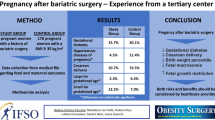Abstract
Background
The prevalence of morbid obesity is increasing steadily among women of reproductive age. In addition to the well-known comorbidities of the disease, it has been shown that the pregnancy outcome for obese women is worse than for women with a normal body mass index. This study aimed to evaluate the pregnancy and perinatal outcomes for women who underwent laparoscopic adjustable gastric banding (LAGB) because of morbid obesity.
Methods
This prospective, population-based study was conducted in a general surgery clinic of a tertiary hospital serving as a referral center for bariatric operations. All the patients underwent LAGB by the pars flaccida technique. A database containing information regarding age, pre- and postoperative weight and body mass index, weight gain, and LAGB-related or -unrelated complications during pregnancy was constructed for all women of childbearing age who underwent LAGB. A questionnaire was designed to provide perinatal data concerning both mother and neonate.
Results
The 74 women enrolled in this study had 81 single tone pregnancies. Their body mass index decreased significantly after LAGB, from 43.3 ± 5.8 to 30.3 ± 3 kg/m2 at conception (p < 0.0001). The average time to the first live birth after surgery was 27 ± 3 months. Band slippage was diagnosed and treated laparoscopically in two patients (2.4%). Weight gain during pregnancy was 10.6 ± 2.1 kg. The rates of pregnancy-induced hypertension and gestational diabetes were 7.4% and 16% of all pregnancies, respectively. In 17 cases (20%), cesarean section was performed. Delivery occurred after 39.1 weeks of gestation. The mean birth weight was 3.09 ± 0.5 kg. Major congenital anomalies, postnatal hypoglycemia, symptomatic polycythemia or neonatal death were not recorded.
Conclusions
The findings show that LAGB is safe for both mother and newborn during gestation and delivery.
Similar content being viewed by others
References
Abrams BF, Laros RK Jr (1986) Prepregnancy weight, weight gain, and birth weight. Am J Obstet Gynecol 154: 503–509
Abu-Abeid S, Keidar A, Szold A (2001) Resolution of chronic medical conditions after laparoscopic adjustable silicone gastric banding for the treatment of morbid obesity in the elderly. Surg Endosc 15: 132–134
Allison DB, Fonatine KR, Manson JE, Stevens J, Van Itallie TB (1999) Annual deaths attributable to obesity in the United States. JAMA 282: 1530–1538
Bacci V, Basso MS, Greco F, Lamberti R, Elmore U, Restuccia A, Perrotta N, Silecchia G, Bucci A (2002) Modifications of metabolic and cardiovascular risk factors after weight loss induced by laparoscopic gastric banding. Obes Surg 12: 77–82
Clegg A, Colquitt J, Sidhu M, Royle P, Walker A (2003) Clinical and cost effectiveness of surgery for morbid obesity: a systematic review and economic evaluation. Int J Obes Relat Metab Disord 27: 1167–1177
Cnattingius S, Bergstrom R, Lipworth L, Kramer MS (1998) Prepregnancy weight and the risk of adverse pregnancy outcomes. N Engl J Med 338: 147–152
Dixon JB, Dixon ME, O’Brien PE (2001) Pregnancy after Lap-Band® surgery: management of the band to achieve healthy weight outcomes. Obes Surg 11: 59–65
Dixon JB, O’Brien PE (2002) Health outcomes of severely obese type 2 diabetic subjects 1 year after laparoscopic adjustable gastric banding. Diabetes Care 25: 358–363
Fielding GA, Allen JW (2002) A step-by-step guide to placement of the LAP-BAND adjustable gastric banding system. Am J Surg 184(Suppl 6B): 26S–30S
Gastrointestinal surgery for severe obesity (1992) National Institutes of Health Consensus Development conference statement. Am J Clin Nutr 55: 5S–9S
Granstrom L, Granstrom L, Backman L (1990) Fetal growth retardation after gastric banding. Acta Obstet Gynecol Scand 69: 533–536
Gross T, Sokol RJ, King KC (1980) Obesity in pregnancy: risks and outcome. Obstet Gynecol 56: 446–450
Kumari AS (2001) Pregnancy outcome on women with morbid obesity. Int J Gynaecol Obstet 73: 101–107
Martin L, Chavez GF, Adams MJ Jr, Mason EE, Hanson JW, Haddow JE, et al (1988) Gastric bypass surgery as maternal risk factor for neural tube defects. Lancet 1: 640–641
Martin LF, Finigan KM, Nolan TE (2000) Pregnancy after adjustable gastric banding. Obstet Gynecol 95: 927–930
Mokdad AH, Serdula MK, Dietz WH, Bowman RA, Marks JS, Koplan JP (1999) The spread of the obesity epidemic in the United States, 1991–1998. JAMA 282: 1519–1522
National Heart, Lung and Blood Institute (1998) Clinical guidelines on the identification, evaluation and treatment of obesity in adults: the evidence report. U.S. Department of Health and Human Services, Washington DC
Ramirez MM, Turrentine MA (1995) Gastrointestinal hemorrhage during pregnancy in a patient with a history of vertical-banded gastroplasty. Am J Obstet Gynecol 173: 1630–1631
Rand C, Macgregor A (1989) Medical care and pregnancy outcome after gastric bypass surgery for obesity. South Med J 82: 1319–1320
Ratner RE, Hammer LH, Isada NB (1990) Effects of gestational weight gain in morbidly obese women: fetal morbidity. Am J Perinatol 7: 295–299
Sheiner E, Levy A, Silverberg D, Menes TS, Levy I, Katz M, Mazor M (2004) Pregnancy after bariatric surgery is not associated with adverse perinatal outcome. Am J Obstet Gynecol 190: 1335–1340
Skull AJ, Slater GH, Duncombe JE, Fielding GA (2004) Laproscopic adjustable banding in pregnancy: safety, patient tolerance, and effect on obesity-related pregnancy outcomes. Obes Surg 14: 230–235
Author information
Authors and Affiliations
Corresponding author
Rights and permissions
About this article
Cite this article
Bar-Zohar, D., Azem, F., Klausner, J. et al. Pregnancy after laparoscopic adjustable gastric banding: perinatal outcome is favorable also for women with relatively high gestational weight gain. Surg Endosc 20, 1580–1583 (2006). https://doi.org/10.1007/s00464-005-0317-0
Received:
Accepted:
Published:
Issue Date:
DOI: https://doi.org/10.1007/s00464-005-0317-0



